Fishing With Face
Thread Rating:
| October 30th, 2012 at 4:46:06 PM permalink | |
| odiousgambit Member since: Oct 28, 2012 Threads: 163 Posts: 6053 | good story. I am behind now on reading all you are posting, so don't be surprised if I ask about something from the beginning or so. I like survival stuff. That's survival not Survivor, those stupid reality TV contest things (I've learned to emphasize this) I'm Still Standing, Yeah, Yeah, Yeah [it's an old guy chant for me] |
| October 30th, 2012 at 5:09:18 PM permalink | |
| Face Member since: Oct 24, 2012 Threads: 61 Posts: 3941 | No worries about backtracking. I'm in a rare mood of having the writing bug while also Having Time To Write!, so I'm still writing more as we speak. Backtrack, skip around, take your time. The stories will be here, and I expect so will I =) Be bold and risk defeat, or be cautious and encourage it. |
| October 30th, 2012 at 5:26:31 PM permalink | |
| johnnyq Member since: Oct 24, 2012 Threads: 1 Posts: 29 | Cool stuff, love the stories. You definitely have a knack for writing ! Hope to see more, time permitting. |
| October 30th, 2012 at 5:42:28 PM permalink | |
| Face Member since: Oct 24, 2012 Threads: 61 Posts: 3941 | Late Spring into early summer is a veritable paradise for the WNY fisherman. The weather has improved, the water has stabilized, and most species, which have finished their breeding cycles and odd eating habits, return to normal, predictable behavior. All manner of cricks, lakes and ponds come to life with all types of biology. Frogs sing in local ponds, eager for a mate, and later fill the shallows with tadpoles in numbers beyond count. Several brands of water plant have shot and begin to really come in. Eggs that were laid in the late winter begin to hatch, and the shallows shimmer in great masses of never ending life. Waterfowl dot the shores with their nests, dive bomb you in your canoe, and later, lead their tiny chicks in parades across the water. Everywhere you look, there is life, renewal and song. It's times like these when a "fishing trip" consists of maybe 10% fishing. Most time is spent looking in awe at all there is to see. It's also during this time of year that I head south, to Chautaqua Lake. If I may get all 'pacomartin' for a moment, the name has an interesting history. The name comes from the Seneca language, and has a number of meanings; Place Of Easy Death, Fish Taken Out, Foggy Place, High Up, and, what has since become the common translation, Bag Tied In Middle. The name went through a number of arrangements based on the French settler's interpretation of what they heard from the Seneca people, eventually settling on "Jadaaqua". When the Dutch came, they translated the French name into "Chautaughque". In the 1850s, the "gh" was dropped, and, shortly thereafter, the "que" became a "qua". "Bag Tied In Middle" is a perfect description of the lake. Roughly 17 miles long and averaging a mile across, there is one point almost dead in the middle, Bemus Point, where the lake is only a few hundred yards wide. Here, I-86 crosses in a four lane bridge. Chautaqua is a very interesting lake, almost two lakes in one. The southern half is very shallow, with an average depth of 7' and a max around 15'. Most structure involves rock piles and vast weed beds. In fact, there are many harvester barges employed on the lake to beat back the rampant weed growth. The northern half is night and day. This half maxes out at 75', and there are plenty of areas where you can be within casting distance to shore, yet be in 50' of water. Along with the odd configuration, the fish species available is unlike anywhere I know, a true "one-stop-shop". My one gripe about it is that is nearly completely developed and jam packed with cottages. From Memorial day to Labor day, the lake is teeming with jet boats, speed boats, power boats, house boats, sail boats, boatercycles (jetskis) and every manner of drunken douchebaggery on the planet. Hit the fall action hard, stop by for great ice fishing, hammer the pre and post spawn in the spring, then find somewhere else. The summer is garbage. Bluegill and Pumpkinseed are abundant, providing non stop action for children whether it's 12 minutes or 12 hours. Yellow perch are plentiful and fantastic eating; my main fishing buddy and I have had days where we've caught 30-40 each. Crappie are also easy to come by, provided you can work your way through the southern weed beds, and many pull their limits. Largemouth and Smallmouth abound in number and size, some even making it into National magazines like Field and Stream. Catfish, bullhead, walleye, carp in excess of 40lbs, even the ultimate freshwater predator, the muskellunge, can be found it her waters, many exceeding 50 inches in length. If that weren't enough, she has a surprise or two in hiding, which I discovered the hard way last year. Most of my fishing focuses in the northern half. I discovered an underwater point that extended a quarter mile into the lake, which dropped quickly from 15' to 30'. I'd sometimes drift and jig across this point, sometimes troll a crankbait, and never had an issue catching more perch than I cared to handle. Directly across the lake from there, there was a rare expansive flat with great weed growth, where I could topwater or crawl a jig for largemouth. Everything I needed, right in one spot. That grass flat is known for musky, and I was frozen dead the first and only time I saw one. Musky are known as "the fish of 10,000 casts" due to their rarity and difficulty in catching. Seeing one in the flesh was indescribable. It looked other wordly, this giant, 50inch behemoth basking in 18" of water. I completely stopped fishing, locked in complete awe just watching it cruise back and forth. One day, there will be a pic of one on this thread ;) Anyways, on this day, the point was unproductive. Water temps and weed growth had risen to the point of shutting down, and as it was July, what I considered "Chaut season" was coming to an end, if not over already. The grass flats likewise yeilded nothing, so I went for "one last try" trolling the point. Per my procedure, I cut the engine well upwind of the point to give me time to set up, and cast out both my rods. One was my typical 5.5' with 4lb mono, the other was my 6.5' meduim/heavy action rod with 25lb braid, you know, in case a musky hits ;) I got them both out, kicked on the trolling motor, got myself pointed in the right direction, and began heading to the point. As I was in 30' of water and expecting nothing, I went to grab a smoke. I stood up, and just kind of spaced out, losing myself in thought. Once realizing I was daydreaming, I tried to remember what I got up for when one of my rods bent in half. My intial feeling was frustration, I was done to death with all the weeds and not catching anything. In one instant, like a punch in the head, I simultaneously remembered that 1) I was in 30 feet of water and there were no weeds, and 2) that was my heavy action rod that does not bend. I grabbed it out of the holder with a yank, and Fish On! A great struggle ensued. It was obvious this was no perch or even a big largemouth, I was certain I finally caught a 5+lb smallie. I got it in a little closer, saw the golden hues, and was sure of it. It dove again, I fought it up again, and it flashed sideways revealing it's length. A juvenile musky? No way! It can't be! And... it wasn't. I got it close enough to get a good look, and it decided it had had enough and just let me look, and my jaw dropped open and I froze for the second time that day. I had caught a 3 foot gar!  I've only ever seen one of these before, caught by Pops up in Lake Ontario when I was 6 or 7. It was the surprise of the year. Those thick, armor-like plates, the giant eyes, the long, needle shaped mouth chock full of glass-shard teeth. It turned a bust of a day into the best trip of the year, a perfect example of why I go fishing. How many people do you know who've held a real, live dinosaur? Be bold and risk defeat, or be cautious and encourage it. |
| October 30th, 2012 at 6:43:47 PM permalink | |
| Evenbob Member since: Oct 24, 2012 Threads: 148 Posts: 25910 | I keep reading this thread hoping for more pics of the hot chick.. If you take a risk, you may lose. If you never take a risk, you will always lose. |
| November 1st, 2012 at 10:19:17 AM permalink | |
| Face Member since: Oct 24, 2012 Threads: 61 Posts: 3941 |
Well, send some luck this way. This year's complete lack of rain and scorching heat threw me for most of the season. Other than the outing mentioned, the only other story of note with her was when she tipped the canoe into the swamp, destroying $500+ worth of equipment =D The season's not over yet, though. Once the waters subside from the hurricane, I hope to have a few last hurrahs for steelhead and king salmon, and she'll be coming along. Fingers crossed. A little more on the gar, because I find it simply fascinating. The gar is one of the toughest, most hardy fish I know. Their swim bladder is vasculated, acting as a primitive lung. About the only thing it requires for survival (other than food) is to be kept wet. As a result, it can be found almost anywhere, from spring fed lakes, to murky swamps, to sewer sludge pits, and even brackish water. The one I caught is a prime example of their durability. As you can see in the dead center of it's body, it sported a massive scar, possibly by a years old musky attack, but more likely from a run in with a boat prop. The length and depth of the scar shows it was laid wide open, a wound that would kill just about any other life form. Yet, this one fought like a champ, was in apparent perfect health, and I'm sure is still terrorizing the shallows of Chautaqua. While a great many of WNY's sportfish are toothless, this one is no joke. Extreme care should be excersized when handling. Gar strike at their prey with a sideways strike, and their fighting when handled mirrors this behavior. Another thing I found, also the hard way, is that even with their mouth clamped shut, they can still make you bleed. Many of those needle teeth poke out from the side, and one swipe of it's head, even with mouth held shut by the net, laid my fingers open (and left a few teeth in my flesh. Good times.)  Photo courtesy of the Tennessee Wildlife Resource Agency While gar are completely edible, it is not advised. With their tough skin and bony composition, it's apt to be more trouble than it's worth, especially with so many more delectable offerings around. A note of caution; unlike any other normal fish, their eggs are highly toxic to humans. Although catching one is rare, and catching a breeding one is rarer, it's a good thing to know since, well, no one knows. Gar are off most people's radar, and I could imagine someone handling gar eggs the same way as any other. Don't do that. As further testament to their toughness, their scales were used by the early Natives as arrowheads. Those in the Caribbean used their skins as breastplates, a sort of primitive kevlar. Early American settlers even used their skin on plow blades to protect the blades. Fish skin to protect iron plow blades...that's one tough fish. One last plea because my conservationist side demands it - I often see this fish for sale at pet stores. If you so choose to have one as a pet, be aware of what you are getting into. While the chemicals they release will keep them "pet sized" in a continously circulated tank, they do have the ability to grow upwards of 5 feet in length. If you are of middle age, there's a chance this fish will outlive you. Think before you buy. Do not release it, or any "pet" fish, for that matter, into your local waterways. Be bold and risk defeat, or be cautious and encourage it. |
| November 1st, 2012 at 1:19:17 PM permalink | |
| Face Member since: Oct 24, 2012 Threads: 61 Posts: 3941 | The late spring / early summer time is also perfect for my most favorite place of all, the pond. Whether it's a town owned reservoir, an old flooded quarry, or a farmer's fire insurance plan, ponds are everywhere, and every one of them offers easy fishing and a ton of things to see. The pond is the number one haunt of the US's #1 sportfish, the largemouth bass. Due to their aggressiveness, size, and sporting displays, largemouth fishing is a billion dollar a year business. From southern Canada to deep into Mexico, someone, somewhere, is hunting the bucketmouth right now. Pond fishing for largemouth is where my fishing life really took off. As a youngin', I didn't need a boat, or a ride, or really any equipment at all, for hours upon hours of enjoyment. I can remember vividly, just down the street from where I am now, taking just a few feet of line and a hook along with me. After a half hour scrounging up worms, crickets, crayfish, just about anything that moved, I'd thread it on the hook and hand toss the bait in the water. No pole, not even a stick, and just hand line bass for hours. Bass are fun because you can use about anything. You can toss a worm and let it sit, toss a crayfish and bounce it along the bottom, flip a foot long snake into a grass mat and drag it back across the top, throw the biggest, gaudiest lure you can find at Bass Pro, anything. Whatever you use, it'll catch a largemouth. Their strikes are savage; often fish will rocket right out of the water after a topwater bait. I've even had some jump at the lure as it was on it's way down from the cast, before it had even hit the water! And these fish just don't quit when it comes to food. I've caught largemouth that were gorged on all manner of life, bellies distended and prey still hanging part way out of their gullet, and still they went after my bait. If you miss a strike, you can keep at it. Even after missing a hook set, the fish will keep after the bait again and again. I've caught crappie where a nearby bass simply could not resist the lure hanging out of it's mouth, and I ended up with a doubler (two fish on one lure) =D 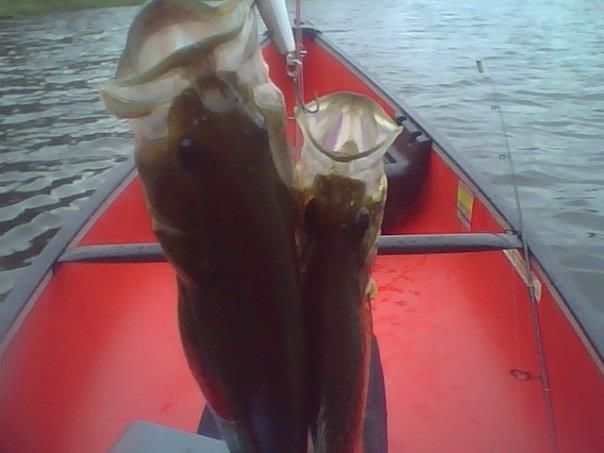 Due to their voracious appetite, largemouth can get big, even the "smaller" northern species. Crayfish, snakes, frogs, toads, fish of all sizes, ducklings, all manner of bugs...if it's small enough, the largemouth will eat it. "Small enough", in this case, means 3/4 of it's own body length. While those big, 10lb steelies are caught on flies the size of your pinky nail, largemouth will strike at anything it thinks it can eat, even if it can't. My main fishing buddy, Jonny L, caught this whopper on a 3" crankbait. 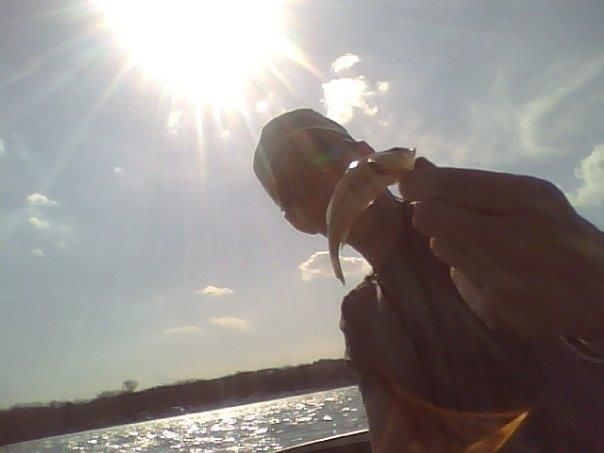 The biggest bass of my life came from the most ridiculous pond in town, using my most ridiculous lure. This pond was some old man's goose pond, a decoration in his yard. I got permission and threw a couple random baits, and sure enough, there were bass in there. The pond was horrendously clogged with hydrilla and millfoil, probably every native and invasive manner of algae in New York. To try to punch through it, I tied on a giant 9" salamander and the largest hook I had. Still, I couldn't get it into the water. After messing around for an hour, there was a mild disturbance, more of a slurp than a strike. After horsing the fish out of the forest, I was left holding a 9lb 11oz largemouth...in NEW YORK! Absolutely once in a lifetime, and I caught it in a puddle in some old man's yard (The State record is 11lb 4oz) But, while 9lb'ers are mostly a dream, even 3 and 4 lb fish are plentiful, and make for a good page in the ol' scrapbook. 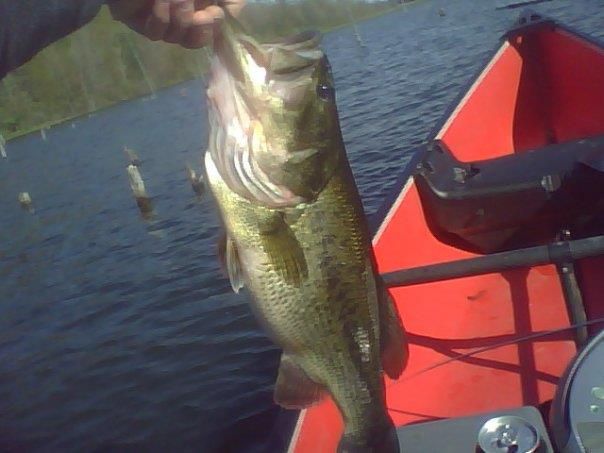 Along with the largemouth, perch and crappie also make their homes in ponds. While perch are random and rarely make for legal size, crappie can be abundant and make for great eating. On one special day, to the indignation of my fellow fishing buddies, I hit the pond by myself and made 21 catches on 22 casts. It was probably the only time in my life when I was getting frustrated for catching too many fish. 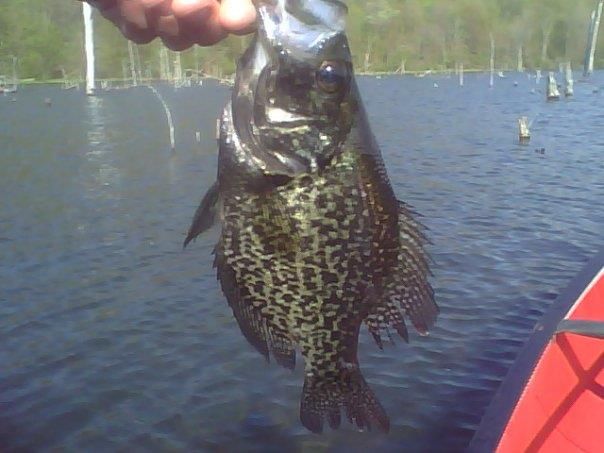 As one last treat, I got to the final step of the lifetime cycle on the same pond all these pics are from (a "cycle" is catching every sportfish native to your area.) As of this day on the pond, I had all the panfish, yellow and jumbo perch, large and smallmouth bass, rainbow trout, king salmon, catfish, black and white crappie,... I had everything except walleye and and something from the Esox family (I grouped pike and musky into Esox, due their extreme rarity) One faithful day, during the fishing orgy that was unemployment, I was back on this very pond when I hooked a good'urn. It fought like nothing before it; not extremely hard, but just a complete non-stop freak out. From the moment I hooked it all the way until it reached the canoe, I had no idea what it was. It wasn't until I lifted it from the water, did I get the surprise of the year...a juvenile Northern Pike. If I hadn't had the picture, no one would've believed me. 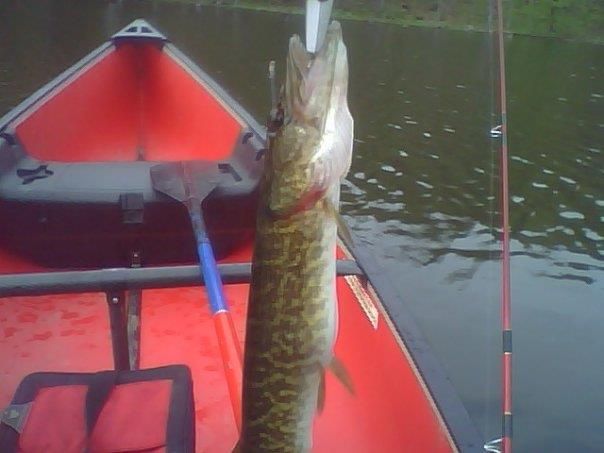 Ponds, man. It's where it's at. The sheer biomass, the things to look at, the beauty, the serenity, the song, the smell, sometimes a bald eagle will even stop by to say hi. Truely my favorite place to be. 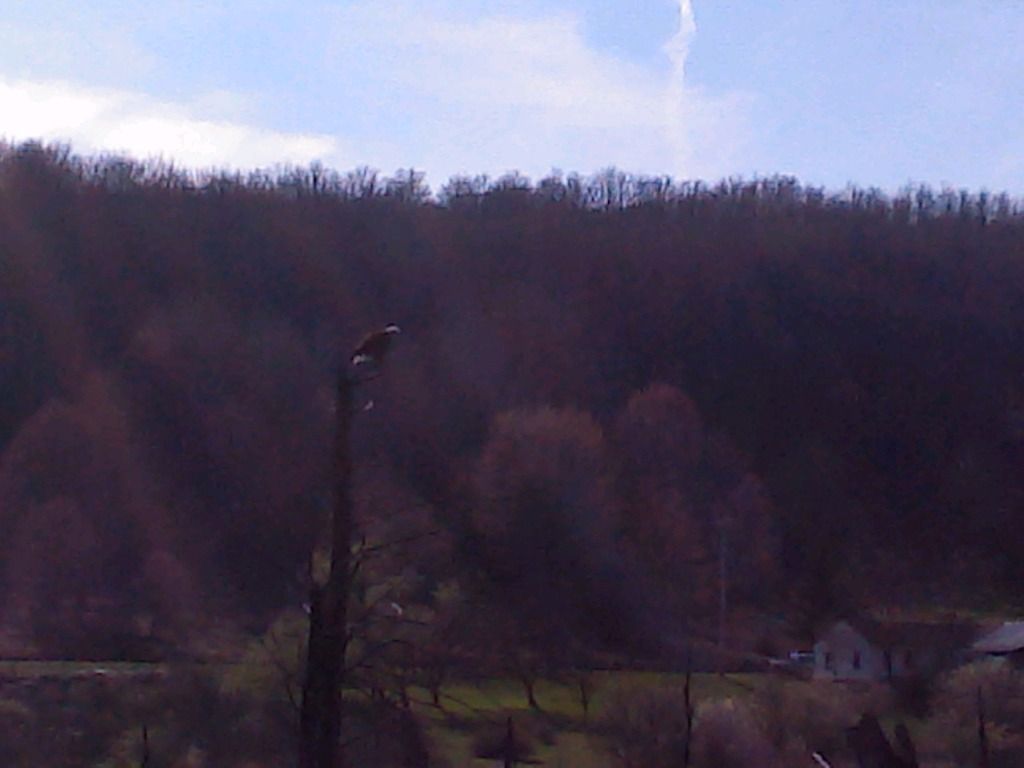 Be bold and risk defeat, or be cautious and encourage it. |
| November 1st, 2012 at 6:35:49 PM permalink | |
| FrGamble Member since: Oct 24, 2012 Threads: 67 Posts: 7596 | Simply awesome, thanks again for sharing and thanks for explaining stuff for us super novices. Could you talk a little about how you set the hook? I've always heard you have to kind of yank it when you feel a bite but sometimes that seems to just pull the lure away from the fish or sometimes right out of the water. Also how do you get the feel for when you really do have some interest? �It is with the smallest brushes that the artist paints the most exquisitely beautiful pictures.� ( |
| November 1st, 2012 at 11:29:08 PM permalink | |
| Face Member since: Oct 24, 2012 Threads: 61 Posts: 3941 |
Thank you, FrG, for your compliments and interest. I love talking about this stuff and feel honored to teach anyone about fishing =) Setting the hook comes down to two things, the equipment and the prey, which I will break down seperately. First, just briefly, I'll talk about circle hooks. These are relatively new, and are just starting to hit the scene lately due to their design, which prevents gut-hooking. In fact, many salt water areas, especially where grouper and other heavily fished species reside, they are the only hook allowed. 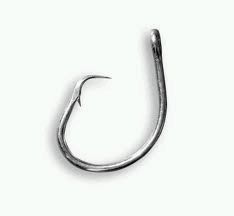 This type of hook could/should be use in any type of fishing where you cast a bait and let it sit, such as using live shiners for catfish. Since the bait's just sitting (and you'll often have the pole propped up with a beer in your hand), the fish will have time to not just "bite", but swallow the whole rig. These types of hooks don't get "set" at all. Once a bite is detected, you simply start reeling. The design allows the hook to pass back out of the stomach and throat without hooking, and, since the fish will almost certainly turn, it will embed itself right in the corner of the mouth where you want it to be. No fuss, no muss, no timed yanks, and no gut-hooks. Yanking actually causes the bait to fly out of the mouth. Detect a bite and start reeling. Simple. Other hooks, whether the infinite models of "J" shaped hooks, or the three point trebles, all get fished basically the same. How hard you set and how soon you set completely depends on gear and species. The whole act of setting is to get the energy of your arm to transfer to that hook point, and there's a million ways that's affected. Starting at your end, it's your type of rod. Excluding fly rods for now, all rods are rated by stiffness, or "action". An Ultra Light is very limp; simply shaking it by hand will cause the tip to whip back and forth. These ratings go up from there to Light, Medium, Medium/Heavy, and Heavy. You could two-hand whip a Heavy back and forth and the tip will barely move, they're ridiculously stiff (the ratings can be found typed right on the rod, usually just above where the reel connects). Whatever energy your natural set delivers, it will be transfered vastly different depending on the action. An Ultra light delivers the force very slowly and absorbs some itself due to its flexibility. A Heavy gives it all in one hard shot. There's a reason why you'd want certain actions some of the time, which I'll get to in the "prey" section. Other than the action of your rod, your line makes a ton of difference. Monofilament (mono) is the most common because of its cheap price and being invisible in water. But, due to its chemical makeup, it has a ton of stretch in it. You might not notice pulling on a few inches while you tie your line, but get 100yds out in the water, and it's nearly useless. All of your set gets absorbed by the stretch, leaving nothing for the hook point. Mono is absolutely fine for regular casting as no one casts 100 yards, but for trolling, it's worthless. Cofilament and fused lines come next, but they're not used a ton and are just steps up from mono. Basically, as we move away from mono, things get less stretchy, much stronger, but also much more visible in water and way more expensive. Braid is the last of these steps, and most fishermen's choices come down to mono or braid. Braid has Herculean strength. The 25lb stuff I have on my Heavy has the same diameter thread as 4 lb mono, and it gets thinner under tension. It feels like sewing thread, but you couldn't break it by hand if you tried. Also, it has zero stretch. The amount of sensitivity is unlike anything I've ever used. Even with 40-50yds of line out, I can tell exactly when a mud bottom turns gravel, a rock bottom turns sand, I can tell a strike from seaweed, I can often even tell what type of fish is nibbling before even hooking it. It's truely amazing stuff. The downside is it's quite expensive. A 100yd roll of mono might run $5, that same 100yds will run $25 for braid. As I said it's quite visible in water, so clear water fish might see it and spook, and the worst thing of all, it's incredibly difficult to work with. Unlike mono, which has memory (ie when casted off a spool, it retains that same coil shape) braid is completely memoryless. When tying mono, you can let off the tension and the knot kind of springs open so you can thread it. Tying braid is like threading a needle, where the needle is also made of thread. Tying a fishing knot with braid is a true test of patience and perserverance, and untangling a knot is not even possible if Jesus himself returned to Earth ;) And should you get a tangle, forget the typical toe nail clippers for cutting it. You need a utility-knife-type razor, or a wicked sharp pair of scissors to get through this stuff. Like everything else in life, there's pros and cons to both. So, you know all the ways your set can be affected, how do you choose? You simply must know the habits and physical properties of the fish you're pursuing, and break your set into two categories, speed and strength. Speed is how quickly you yank when detecting a bite, Strength is how much power you put into it. Take a look at the crappie posted above (it's the pic of the "doubler", and it's the smaller fish on the right). The mouth of these things are incredibly fragile. The jaw structure is thin and the "skin" is little more than a translucent membrane, almost like living wax paper. A strong set, heavy action, braid, all of these things will rip it's face off, and I say that semi literally. But these things are quick, and they dart after prey. If I was fishing them, then Speed is high, Power is low, and I'm using Ultra Light action with Mono if I can help it. Rainbow Trout, on the other hand, have very thick mouth structure. They don't call them steelhead for nothing. While I still use my Ultra Light with 4lb Mono, I've lost a not-inconsiderable amount of hook ups as a result. A Heavier action, Braid, and Strong set are all good ideas. Speed is dependent on conditions. When drifting egg sacs or skein, trout will occasionally mouth or chew for a moment and a fast set might pull it right out. However, when using a spinner, many salmonids rush in and take quick swipes. If you don't rip it as soon as you feel it, or sometimes even anticipate it when you have a visual, that fish will already be 5 feet away and gone by the time you do. Without going too deep into this, because a whole book could be written on this subject, know that the type of equipment you use is soley dependent on type of fish. You can use an Ultra and Mono for trout same as you can use a Heavy and Braid for crappie, but know you'll have to make up the difference physically if you want the best results. As far as when to set and the whole Speed and Power thing, some of it's obvious (quick and light for little darty fish, slow and heavy for a big, slurping lunkers), some of it is going to take you learning your prey of choice. No matter what fish we cover, it's going to change depending on life cycle, weather, and season. A bass in cold water is going to be sluggish and sets need to be slow to allow them to get the bait in their mouth. Spawning bass rarely strike, most of the times they just mouth something to move it away from a nest or charge it to scare away, so sets are maddeningly slow. Early summer bass are killing everything in sight and swallowing it whole, if you don't set fast, they'll feel the plastic in the lure and spit it. This same concept applies for all manner of fish, so get to work. Figuring it out is half the fun =) Last thing, about the "interest". I'm assuming you mean "have a fish interested" or otherwise are anticipating a bite. The absolute obvious and easiest is sight. A pair of polarized sunglasses is one of my most important pieces of gear. 1.00mm Berkely's, you can get 'em for $10 at Walmart. As long as the water isn't complete mud, and I'm not fishing 20+ feet deep, much of my strike anticipation info is visual. Nearly all fish, after hitting, spin the other way. I call it a "flash", because you can often see their sides and lighter colored bellies when they do so. Since the glasses kill the glare and allow you to see into water, I'll follow my lure visually the whole way. In cases where I lose it, either due to clarity or water turbulance from rapids, I'll follow my line as far into the water as I can and make a guess as to where it is. If I see a flash where my lure should be, I yank, even if I don't "feel" anything. When fishing ponds where the water is glass and my lures are shallow, other clues point to a strike. A bass charging at a lure a few inches under the surface will leave a wake behind it. Even the faintest ripple shows up on a glass water pond. Sometimes, I can even see a weed bed part somewhere to the side or behind a lure. Weeds don't have muscles, so something moved it. I see that, and I get ready. When I "loose line" it, where I use a plastic and hop it through the water or bounce the bottom, there's often some slack in the line. It's usually a tap-tap-let-it-sink motion with the rod. That loose line will just sit in the water, slowly sinking at the end as the lure drags it under. When a fish hits, the line itself will twich, or sometimes just start moving to the side. Line don't have muscles, so something's moving it. I see that, I give it a yank. In all cases where I'm unsure, the "yank" is little more than a strong motion using just the wrist. If it's a fish, I've stuck it enough to give a follow up set with power and bury the hook; if it's not a fish, I've kept the lure in the water, enabling follow up strikes and preventing, well... this... 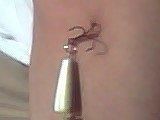 That's an arm, if you couldn't tell. Good ol' Jonny L again =) Lastly, it's just knowing the fish's habits. If I'm after smallmouth in the crick, I cast to shore. As soon as it drops over the ledge, I anticipate a strike. Past an underwater log, anticipate a strike. Wide open water, relax. Coming up behind a big rock, anticipate a strike. Trout are different. Same exact location, same cast to shore. Drop of the ledge, don't care. Past the log, c'mon, c'mon. Wide open water, why'd I cast so far? Past the rock where the water funnels and speeds up, here it comes, get ready. Knowing your prey's habits and habitats goes a long way in being ready for that strike. If all that fails, just remember: One More Cast. Just one more, and it'll all be worth it ;) Be bold and risk defeat, or be cautious and encourage it. |
| November 12th, 2012 at 12:27:09 AM permalink | |
| Face Member since: Oct 24, 2012 Threads: 61 Posts: 3941 | Summer time in NY is when fishing gets expensive. The raging crick that was filled with cold water trout and spawning smallmouth just a few months before reduces to a mild burble, with temps reaching 75 degrees. Lovely for a swim, but all the fish vamoose. The ponds still teem with life, but that includes plants. Weed beds turn into weed mats, where not even the heaviest stuff will punch through. Sunfish can still be caught at the shore at all times, but the bigger fish hide in the weeds and the depths to escape the heat and sun. Even smaller lakes like Chautaqua are overrun by weeds and non-fishing water enthusiasts, making an enjoyable fishing trip nigh impossible. Hiking the crick is pointless, and canoeing the pond is hopeless. About the only choice left is to hit the deep water, and in my neck of the woods, that means Lake Erie. Spending much of my youth on Pop's 24' cabin cruiser, I know Lake Erie. The thing that I remember most is how scary it can be. A 'nice' day brings a chop that rattles the spine; a 'bad' day is downright terrifying. I distinctly remember waves so big you couldn't see the trees on the shore, and the odd one that would crash over the stern of even that big ol' cruiser. Taking my 17' dinghy out there wasn't something I dared for years. But after making it home from one memorable outing, where I got caught on the water...in a thunderstorm...in a canoe...I finally got the balls to take Captain Jax's Sparrow out into those crystal clear waters. With my small boat and Erie's tendency to go ape shit in the matter of minutes, all my journeys start in Sunset Bay at the mouth of the Catt, and stay firmly within the Sunset Bay area. With a top speed of 24mph (or 27 tapped out if I want to risk overheating ;)) I dare not go further than 30 minutes out. As Erie is a basin lake, there isn't much structure to speak of. Much of the bottom is flat and barren, making those first few recon trips completely uneventful. But when you can find structure, be it a sandbar, a point, good weed growth, anything to set it apart from the vast barrenness typical of Erie, boy, are you in for a treat. My love of Erie got rekindled on a walleye trip gone wrong. Fishing buddy Wally promised myself and Jonny L that good walleye could be caught, not in the 60' everyone said, but in 15'-20', right in the bay. We showed up early to fish all night, and with the sun still up, I quickly hooked a few great smallmouths. Once the sun set, so did the fishing, and the walleye never came to be. But I was hooked. It was so easy, so close to home, and come the next day, I went right back to that spot. I caught so many fish my forearms were cramping, my wrists felt sprained, and my back ached from the effort. My fishing, which usually ends in June, just got extended through the summer =) Big billed rapalas that dive to 10' to 15' in 20' of water were the ticket this year. Trolled at 2 to 3 knots, we'd repeatedly circle over the same point again and again, and for most of the summer, every trip was a killer. Summer time trips with Captain Jax almost always were trips to the crick to catch crick chubs and shiners. 4" or not, he couldn't get enough of it, and if we caught a 6" or even an 8", he was beside himself with exclamations of "that's a big one, daddy!". Getting into 4 to 5 pound smallies blew his mind, and, to be honest, the minds of his dad and grandpa, too =) For so long, we only knew the 2lb'ers of the crick and the ponds; getting ahold of 5lb'er after 5lb'er was something we could not get enough of, and we must've went nearly every week the year. 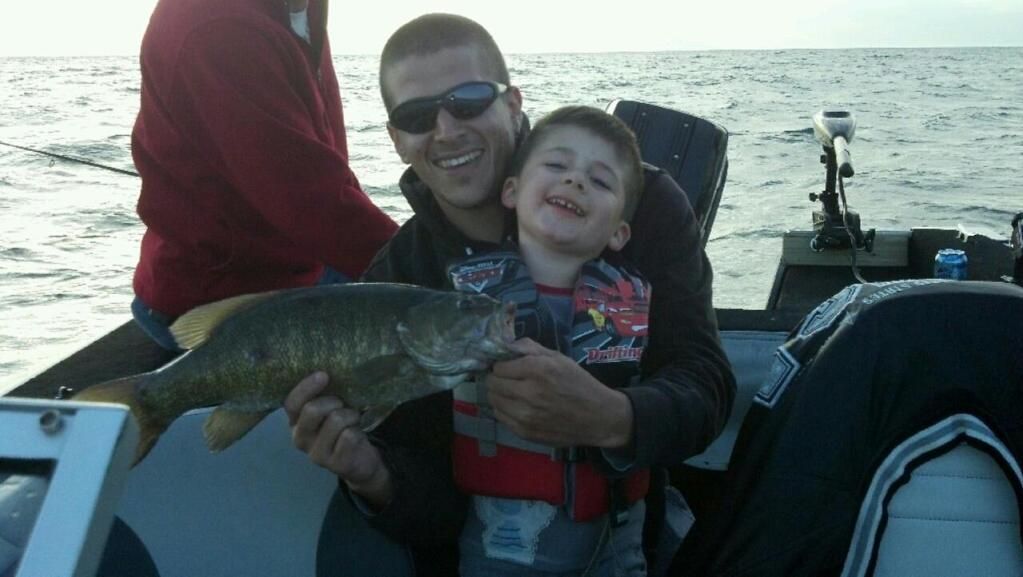 Jumbo perch weren't too hard to come by either, and after nearly a lifetime of culling perch because the didn't reach the 9" minimum, catching perch that topped 2lbs was otherwordly. On nearly every trip, I must've wondered aloud "why haven't we been doing this the whole time?", it was just crazy. Even sheephead (freshwater drum) were a welcome sight. Considered a "garbage fish" almost always, I just couldn't believe the ones we were catching. Sheephead have a sucker-like mouth, like a sucker or carp. They bottom feed and, as far as I knew, were only caught on live bait. But damned if we didn't catch some trolling these crankbaits. In my youth, they were 2 or 3 pounds, and never once was I happy to see one on my line. But these... my god. Pops took the $5 for biggest fish on this particular day, catching a monster sheephead on crankbaits. 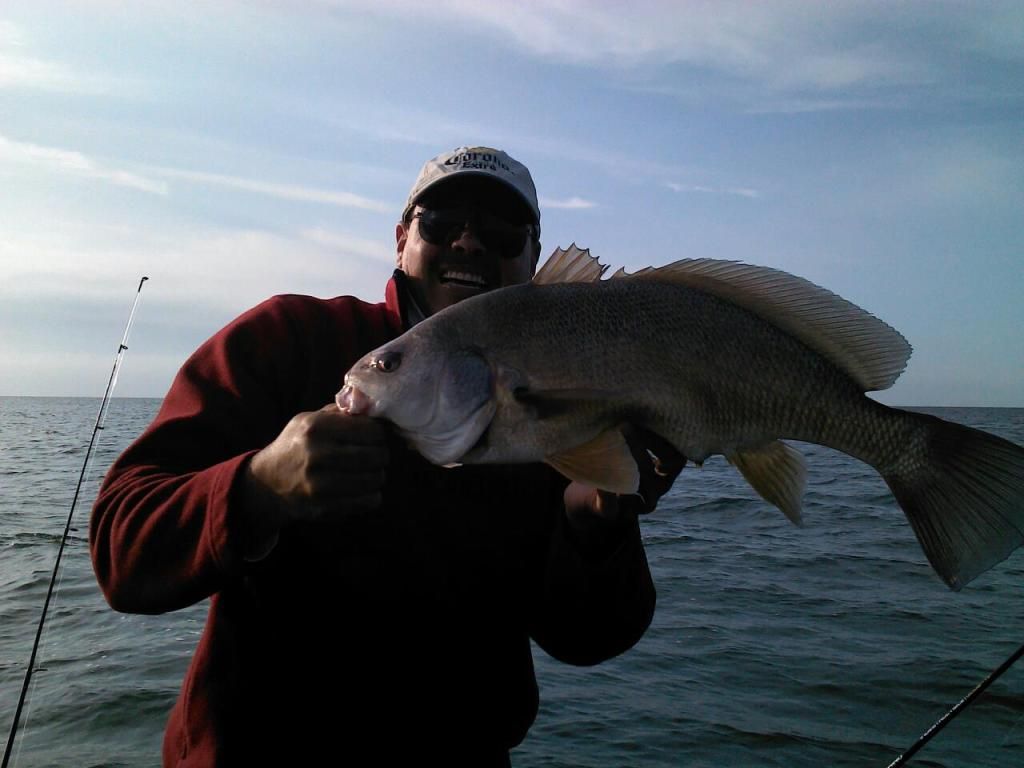 It may not be believed, hell, I wouldn't if someone told me, but a few times we saw the waters of Erie like glass. One day, as the sun was setting, all I could see all around me were disturbances on the water. Knowing they must be baitfish, and knowing baitfish only surface because they're being chased, I starting chasing the disturbances and throwing baits into them. As soon as they hit the water, Boom! White bass for days. I haven't caught a white bass in 20 years, haven't seen the lake like glass ever, and here we were, sitting on glass, catching fish as fast as we could cast. I don't even have any pictures, as the fishing was simply too fast and furious to grab the camera. And wouldn't you know it, we finally found the shallow walleye Wally promised earlier in the year. I didn't believe it when I saw it; I thought I caught some sort of giant, silver perch. But once he opened his mouth and revealed the teeth, it was certain. My first ever walleye, and I completed the life time cycle, catching every single sportfish native to Western New York! Pops even caught an 'eye or two, and likewise thought it was a pale perch, lipping it and ragging his thumb all to hell on the teeth lol. I'll laugh at him for years for that one =) On the subject of injuries, I'll address a common one - hooks into your person. There are two types, ones that enter and exit your skin, exposing the point, and ones that simply embed. For ones that enter and exit, the book says for you to use wire snips and snip off the end under the barb of the hook, leaving only the smooth part left, and threading it back through. You can... but do you know how hard you have to squeeze to cut a hook? Good luck not pulling on the wound while you do it. And who carries wire cutters around anyways? Just use your fishing pliers to smash down the barb onto the shaft, then thread the hook back out. Yes, I speak from experience ;) For ones that embed, the book says to loop a length of fishing line around the bend of the hook, then, with slack in the line, yank sharply back, pulling the hook out like you're pulling a tooth. This'll work, but in the time it takes you to find some line, cut it, loop it, and get ready, you have a lot of time to think how very, very much it's going to hurt, and how much it hurts already. Fishing pliers are almost always handy; grab the shaft of the hook with them and just rip it out =D I dropped one of those giant sheephead this year, sinking both trebles into my hand up to the bend of the hook. I mean real deep, and I had an 8lb fish losing it's mind on the other end of those same hooks. Pliers are your friend, grab it and rip it ;) And lastly, remember fishing's a dirty business. Metal puncture wounds with bacteria laden hands should be tended to. Have your tetanus shots updated. Or not. Mine's 4 years overdue; I just bled all over the boat and kept on fishing. And I'm still here =P With so much exposure to fishing, Jax had had enough. I don't mean with fishing, I mean with watching. The livewell full of catches held his attention less and less, and he soon wanted to help. It started with just holding the rod, then he wanted to reel, and after much practice (on his own and by his own decision) of casting his Lightning McQueen rod in the driveway, he demanded us to just give him the pole and let him do it. Once he had it in his head, he was going to do it, and the first time the rod bent, he made a run for it. Pops stopped him, set the hook, and tried to hand the rod to the boy, but the kid nearly got knocked down on the first run. Adamant, Jax pulled and pulled on the rod, not stopping until Pops staged up behind him and out of sight, still with one steadying hand on the rod (thank god). A mighty struggle ensued; I thought it was the funniest thing ever. Jax leaned back, trying to drag the fish in, every now and again the fish would run and Jax would stumble forward, trying to catch his balance while refusing to let go of that rod. After what seemed like forever, we heard the splash at the boat and knew it was in. Pops convinced him to let go and look, and then looked himself. I heard an exclamation not fit for polite company, saw him reach and grab it, and then I made my own exclamation equally as unfit. That little 3 year old ball of lightening dragged in the biggest fish of the year! He was completely stoked and still talks about it to this day. And, at least for now, I got my "little captain and best friend" (as he says, and I agree) completely hooked on fishing with dad =) 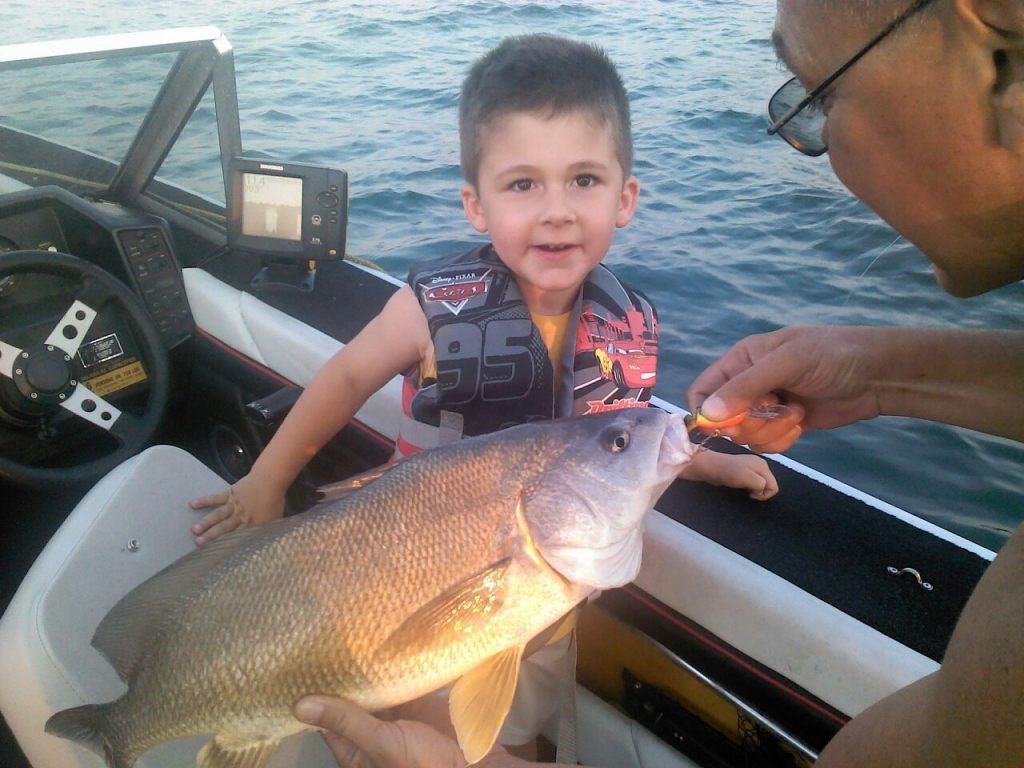 After a hard day of fishing, the sunsets never failed to impress. The lake starts to calm down, the fishing winds down, the blazing sun lets up, and your free to just sit back, relax, and take in the view. Whether it's holding your son, asking him him if he had fun and how much, or kicked back with your buddies and finishing the last beer of the night, there are very few endings in life that contain such severe serenity and a feeling of a job well done than a sunset on a lake after a great day of fishing. Take a pic and share with others, show them the beauty, get them outside. You might even get a real rare treasure, like proof that Erie can be (once every eternity) as smooth as glass =)  Lastly, because it seems to be a trend of sorts, the "one last cast" of the day. The Catt is famous for many things, and catfish are certainly on that list. The mouth area, where waters dig out the banks and bridge pilons to 20'-30' depths, the water's slow, and the logs jam up the sides, is huge catfish country around here. From April to June, the nights find the shores dotted with lanterns and pole sticks as the old timers throw their chicken livers, stinkballs, and putrid fish slices into the murky depths. On this day, me, Jonny L and Wally were returning from the lake after another unsuccessful walleye trip, when Jonny L threw his crank in the water. As we were in the Catt at a depth of 5', going 6 knots, and he had a 15' diver on, I laughed at him, telling him he's going to hook a tree and lose a $15 lure. Wally, who had already packed all his gear, grabbed Jonny L's other pole and tossed it in, which Jonny L, of course, gave him hell about. I sat at the wheel, frustrated about the trip and lamenting my idiot friends as I prepared to make that final, 90* turn into the docks. As soon as I cut the throttle to turn, I heard the familiar buzz of drag letting out, and Wally yelled out "holy $#&^, got one!". I never cut the throttle. I looked, saw that he had a fish and not a tree, and figured he snagged a carp. No way could a fish be caught like this, at least not anything good, and it just looked big because we were moving so fast. But as I docked and cut the motor, still, the rod stayed bent in two, and every now and again gave out another buzz of drag as the fish made a run. Still, it's gotta be a carp, right? The fish get close and surfaces, but as it's night and the Catt's waters are muddy, I can't tell what it is, but I can tell it's mouth hooked. A cat? Gotta be, but no way. How in the world...? This effing guy, trolling a 15' crank in 5' of water at 6 knots, somehow caught a whopper of a cat. It wasn't a record by any means, but it's sure hard to be mad at a fish such as this. It saved a bust of a day, made me look like an ass for picking on them earlier, and worst of all, just sunk that thorn into my side a little deeper. That thorn, that curse of the fisherman; Just one more cast, just one more. I'm know this will be the one! ;) 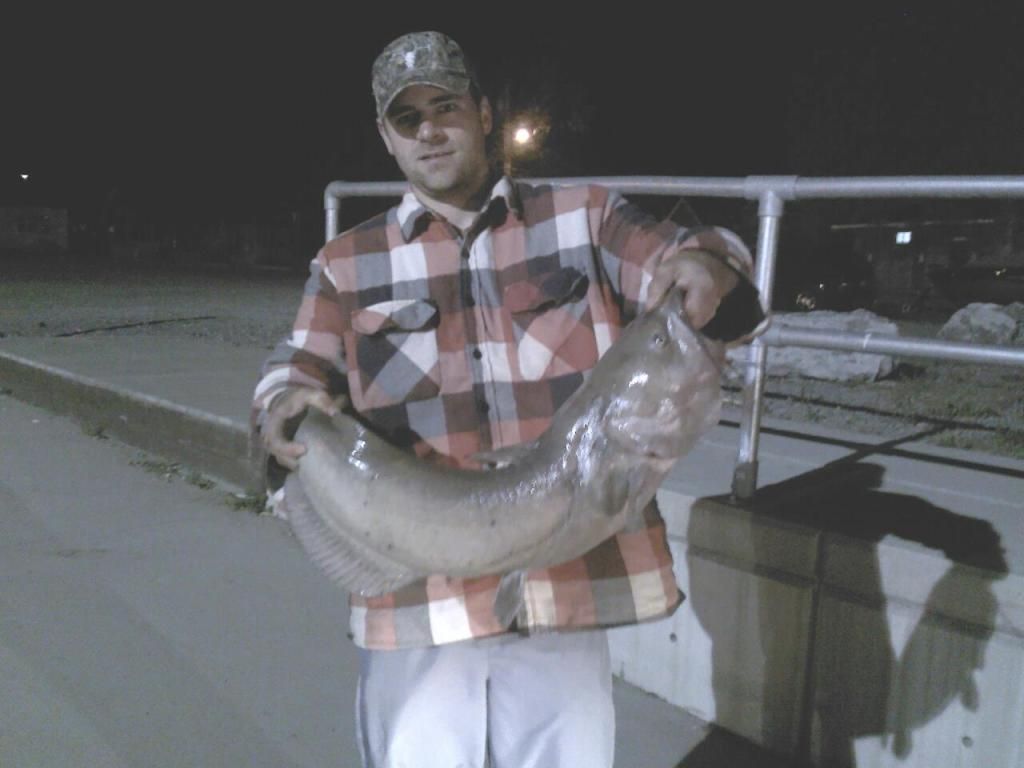 Be bold and risk defeat, or be cautious and encourage it. |

